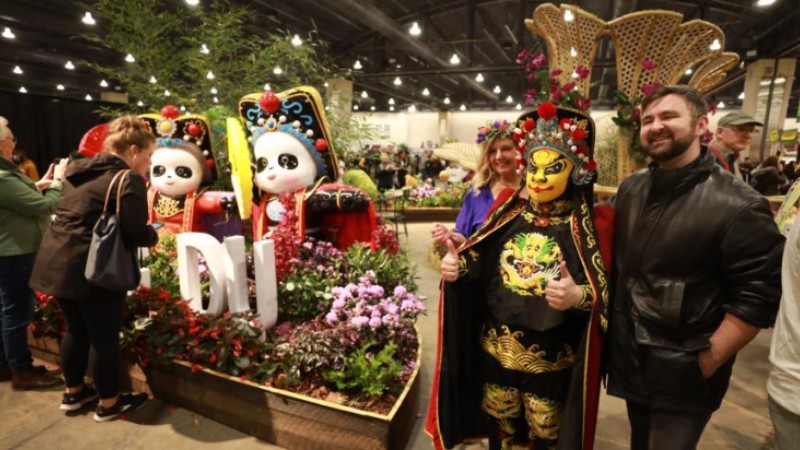Intangible cultural heritage workshops contribute to China's rural revitalization drive
China has set up intangible cultural heritage workshops in the past few years, which have protected and inherited the valuable cultural legacies, while contributing to the country's rural revitalization drive.
Over 2,500 workshops for intangible cultural heritage techniques have been established by the Ministry of Culture and Tourism, the Ministry of Human Resources and Social Security and the National Rural Revitalization Administration, among which 1,400 are located in once poverty-stricken areas, covering over 450 counties lifted out of poverty and 85 counties identified as vital to national rural revitalization.

Photo shows the workshop for Xiabu cloth in Zhongyi township of Shizhu Tujia Autonomous County, Chongqing. (Photo/Chongqing Municipal Culture and Tourism Development Commission)
Southwest China's Chongqing Municipality and east China's Shandong Province together established a workshop for Xiabu cloth, a traditional hand-woven linen material made of ramie and hemp fibers, in Zhongyi township of Shizhu Tujia Autonomous County, Chongqing. Clothes made of the fabric are believed to keep the wearers cool in the summer. Since it was established four years ago, the workshop has helped 180 needy households increase their income, with its products being sold to overseas markets. The successful business mode has been replicated in many counties and districts of Chongqing and Bama Yao autonomous county in south China's Guangxi Zhuang Autonomous Region.
Yang Yuanju, who once lived a hard life, joined the workshop in 2019. She learned the weaving techniques very quickly, and could earn 40,000 ($5,790) to 50,000 yuan a year.
The rural workshops have not only enabled women in rural areas like Yang to work at their doorsteps, but also brought hope to the elderly and people with disabilities. A weed painting workshop in Huaiyang district, Zhoukou city, central China's Henan Province has offered training courses to 803 people with disabilities, long-term job opportunities to 96 of them, and helped nearly 100 households with people with disabilities shake off poverty. Apart from offering jobs to 10 physically handicapped people, an oil-paper umbrella workshop in central China's Hunan Province provided work opportunities for eight septuagenarians.
Traditionally, products of intangible cultural heritages had limited patterns, whose aesthetic values may not satisfy consumers. But today's workshops, with the aim of reaching domestic and foreign markets, combined the traditional cultural legacies with modern elements to make them more fashionable, winning recognition from consumers.
Long Luying, an inheritor of Miao embroidery in Shibing county, Qiandongnan Miao and Dong Autonomous Prefecture, southwest China's Guizhou Province, established a workshop, but her products did not sell well in the early days. After participating in a training program for intangible cultural heritage inheritors initiated by Tsinghua University, Long and her son combined the embroidery techniques with modern elements, and invited designers who returned from Italy and France to their teams. Their products, including ties, scarves, shawls, clothes of the Miao ethnic group were well received. By the end of 2021, the workshop had six branches with a total of 1,297 employees, and an annual output of nearly 30 million yuan.
Wazao village in Hunan Province, where a traditional fish noodle originated, enjoyed widespread acclaim after a local food company set up a fish noodle workshop there. Taking advantage of the success of the workshop, the village developed tourism, and became a hot tourist attraction, receiving over 200,000 visitors a year.
"Intangible cultural workshops, which integrate the cultural legacies and relevant industries, injected more impetus into the countryside, and strengthened the internal driving force for the rural areas," observed Qiu Huanguang, head of the School of Agricultural Economics and Rural Development of Renmin University of China.
Photos
Related Stories
- Intangible cultural heritage inheritors bask in the spotlight
- Revitalizing intangible cultural heritage for a youthful, vibrant future
- China Intangible Cultural Heritage Protection Annual Meeting held in Yulin, China's Shaanxi
- Inheritor dedicated to passing on technique for making colorful lanterns in NW China’s Shaanxi
- Guangdong Lion Dance presented in Foshan
- Intangible cultural heritage boosts rural vitalization in village in China's Henan
- Intangible cultural heritage helps boost rural vitalization
- Chinese intangible cultural heritages shine brightly as protection and inheritance strengthened
- Craftsman builds village for intangible cultural heritage items to thrive in SW China's Guizhou
- China's traditional tea-making enters UNESCO cultural heritage list
Copyright © 2023 People's Daily Online. All Rights Reserved.









